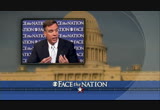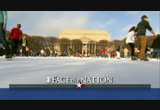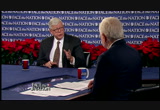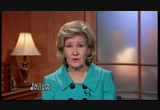tv Face the Nation CBS December 23, 2012 8:30am-9:00am PST
8:30 am
wayne keene. and we'll hear from senator mark warner of virginia, and kay bailey hutchison of texas. we'll also talk to the first black senator from the south since reconstruction, newly designated south carolina senator tim scott. plus, we'll hear from actor ben affleck on, among other things, reports he may seek the senate seat being vacated by john kerry. who has just been nominated to be the next secretary of state. >> well, one never knows. i'm not one to get into conjecture. >> schieffer: why not? we do, because this is "face the nation." captioning sponsored by cbs from cbs news in washington, "face the nation" with bob schieffer. >> schieffer: and good morning, again. we start this morning with david keene, who is the president of the national rifle association.
8:31 am
friday the n.r.a. made its first public station since the newtown shooting and the reaction from the gun control vacation was scathing, no reaction there. lloyd grove of the "daily beast" summed up the reaction by saying the reviews were so brutal they would close a broadway show on opening night. this was news conference a mistake, mr. keene? >> not at all. and, fortunately, we're not on broadway. this isn't a joke. you know, we remained silent right after newtown because we didn't think it was appropriate to comment at time. but now we've come out and looked at it and the question on everybody's minds we tried address is what do you do to prevent this from happening in the future? you know, it was interesting, bob, because that week i was in israel. and they had a spate of school shootings in the 70s and they decided they needed to have security at their schools. they started out with volunteers. they eventually institutional
8:32 am
tides and now they have armed security at the schools and they stopped the problem. in this country-- and although the reaction from our critic was, well, this is a crazy idea. the fact is, 23,000 schools right now, have armed security guards. they have them in chicago. they have them in many schools in virginia. it was propose bided by bill clinton the year after the columbine shooting and they set up legislation called cops in the school program. has not been fully funded. a lot of schools don't have it. what we were saying is really the question that parents across this country are asking is how do we protect our kids? >> schieffer: a couple reactions. the president of the international association of police chiefs says, number one, this is totally impractical. he says he happens to be the chief in the freemont, california. he said if you put police officer in every school in freemont, he'd have to put half his police force there. we all know the budget constraints that all these governments are under.
8:33 am
on the other side, the president of the national education association says we do not need guns in schools, period. >> well, they need protection. the kids need protection. bill clinton thought they needed protection. the israelis have tested it, and it works there. you know, what we've suggested that each school district and each school administrator look at the problem that they face. right now you have a mix. you have federally funded officers in many schools. you have a mix of funding in other schools sprup volunteers in some place where's administrators are armed with concealed carry and all that. we're not saying that it ought to be this or that, that one size fits all program will work. what we are saying is the first obligation that we have is to protect our children and the way do you that is you look at the problem. and know-- >> schieffer: don't you try to also try to get some of these guns off the streets, get some of these guns out of markets?
8:34 am
every study shows that when a society-- the fewer the guns, the less homicides. >> that's not true. >> schieffer: well, actually, it is true. that comes from the harvard school of public health. its studies show conclusively that there are more firearms when-- when there are more firearms there are more homicides. in awe straightia, we have seen-- in australia, we have seen homicides go down tremendously. >> i understand we're not talking about australia. but in fact the homicide rate in australia and the united states during that same period was dropping at roughly the same percent annual. we have the lowest homicide rate we've had in decades. >> schieffer: but the reason that we have fewer homicides right new, more people are getting shot. the number of people getting shot is up 20%. homicides are down for the same reason that deaths are down on the battlefield. you have better emergency room coverage. you have better medicine. >> and that's good. but, you know, thinking of this
8:35 am
whole-- you know, in 2010, the f.b.i. statistics show that more people in this country were beaten to death than were killed by long guns of all kinds, including the so-called assault weapons. now, anybody killed by any method say tragedy. i'm not arguing that it isn't. what i am saying, bob, is that when you look at the problem-- let's say we pass diann dianne feinstein's bill, how would that stop the next school shooting? it wouldn't. because it doesn't take guns off the street, and if you did, you couldn't. so that doesn't solve the problem. >> schieffer: but doesn't it make it more difficult? mr. keene-- >> it doesn't-- >> schieffer: if a man had talked about that school in connecticut with a baseball bat, he might have given a couple of people a concussion, but all those children would not be dead. >> well, you know, the fact that something is misused, whether it's a baseball bat or the mass killing in a chinese school with an axe and a knife, doesn't mean that you ban baseball bats, axes and knives or guns.
8:36 am
>> schieffer: nobody is saying-- >> it means suprotect the innocent on one exphawnd try to keep weapons out of the hands of those who are likely to commit such crimes. one of the problems and this is reflected in public attitudes is what's wrong with our mental health system? because a lot of these people are not even-- are not even-- when they've been seen as having problemes, nobody does anything about it. in connecticut, it's very difficult to have outpatient treatment because of a.c.l.u. lawsuits. i'm not saying that every mental patient is a potential killer. i'm not saying that everybody that watches a video is a potential killer. that's not true. but neither is everybody who owns a gun is a potential killer. >> schieffer: of course they're not. i had a gun when i was 12 years old. i got a double-barreled shotgun-- >> you still have it? >> schieffer: what i'm saying is shouldn't we be putting these things on a higher shelf so the mentally ill and the derraged people can't get to them?
8:37 am
and to do that you're going to have to tighten this up. it is harder for me to get a driver's license than it would be to buy a gun. why is that a good thing? well, you're-- you ought to be able to get a driver's license at your can age glefd do you know what i had to do to get a driver's license? let me just tell you what i had to do. i had to go to the doctor and get a complete physical. i had to go to another doctor to get an eye test, and then i had to go down and take the driver's test. i got a driver's license. i don't mind doing that. i think that's a good thing. why should i be able to just drive to virginia and buy myself a gun? >> well, there's a difference between a driver's license-- driving is a privilege, and owning a firearm which is a constitutional right. the government has to show why you couldn't should a right to exercise your second amendment rights. there are people who aren't allowed to buy firages fellons minors, and that's all legitimate. we have since the late 1960s have been urging those people
8:38 am
adjudicated to be mentally ill be included in the national database. when you buy a gun, bob, you go to the store and there's an instant check. 23 states have not put any of that data in there-- in many kazs -- glief don't disagree away ought to have some record of those people but shouldn't we also have a record of people who have firearms. >> i think not. we know we check them. in this country we don't like to maintain huge databases of everybody. we have privacy rights, we have constitutional rice rice. >> schieffer: we also have to show identification when we get on an airplane. >> sure we do. >> schieffer: do you think that's a bad thing? >> i don't think that's a bad thing, no. when you buy a giyou are checkedly in the instant check system and airfare period of time, they can't maintain that as a federal if gun registry, but they check you when you buy that firearm and you should. >> schieffer: what about when
8:39 am
you go to a gun show? >> when you go to a gun show, bob, 98% of the guns you buy there are also checked, because most of the people who have tables at gun slows dealers. >> schieffer: don't you agree we should tighten it up-- >> a private purchaser from another individual is different. >> schieffer: let me ask you "the rubber hits the road" question. will you oppose as the national rifle association any attempt to time the gun laws, to do what even the international association of police chiefs says is a good idea, to ban these military-style assault weapons? will you oppose that? will you continue to oppose that? >> we will continue to oppose a ban on semiautomatic weapons that are used for perfectly legitimate purposes. these aren't military weapons. if we equipped our army with the ar-15 we'd be beaten by every third world-- you know, every third world dictatorship in the country. military weapons fully automatic weapons and that's illegal. you don't get those. that's not what we're talking
8:40 am
about. the impression often is, bob, that is what we're talking about, but it isn't. we're talking about sporting arms-- you know the ar-15 is the highest selling-- >> schieffer: how many rounds can these weapons discharge, say, in five seconds? >> well, they fire when you put trigger. >> schieffer: sure and they keep firing. >> just as your shotgun-- not your shotgun bout most shotguns do. >> they don't keep firing. that's a fully automatic weapon. these are not fully automatic weapons. >> schieffer: but these are dangerous. even justice scalia in the opinion that said everybody has a right to own a gun said that there should be no doubt that this should not interfere with putting limits on what he called unusual weapons. >> any constitutional right, any constitutional guarantee, the first amendment, you can't yell fire in a crowded feature theert. second amendment, reasonable restriction against fells expontz others are there. in the it next few years, there are going to be dozens of lawsuits brought to say what is
8:41 am
and what isn't reasonable restrictions. we'll argue those, and we're perfectly willing to. today, bob the question isn't how many bullets are going to fit in a magazine. is the gun somebody has got ugly or not ugly? the question is can we keep guns out of the hands of people who are potential killerses. that's hard because they're hard to identify. and can we protect ourselves kids? that's what it's about. that's what we're trying to respond to. that's what the public wants. it's something that's been proven. it's something that bill clinton has suggested. it's something we think is necessary. now, that can be funded by the federal government, the state government. you have have volunteers, it can be done by districts, but every school district ought to look at it and say we have these kids in our charge during the day, and we need to have awe plan to protect them. >> schieffer: i think it is a question that is certainly worth exploring but what i found odd about your news conference-- and maybe it's my bias, i don't know
8:42 am
what it is-- but i found it odd that when you came on television at this news conference friday, you seemed to blame the mentally ill. you seemed to blame hollywood. you seemed to blame the media, the video game manufacturers. you did not seen to think that your policies have had anything at all to do with this. >> we don't think they have. >> schieffer: you see no responsibility? you don't see-- >> we're 35th a country, a free country in which people have a right to exercise their second amendment rights. we're living in a country where in the last few decades as gun ownership has increased violent crime has fallen. what we have though in this country-- in any country-- a percentage of people who are, frankly, either evil or crazy. and the question is how do you prevent them from acting out their fantasies or their desires? that's a problem. now, we can't condemn and we don't condemn the mentally ill. most people that are mentally ill are not a threat to anybody. but what we are saying is that
8:43 am
those people who are potentially dangerous-- and in many cases, including school shertz-- the people have been tagged as being potential dangers. >> schieffer: let me just ask you this-- if you claim the media, video games, hollywood are the main problems, then why are gun deaths in every other industrialized nation, including canada, germany, great britain, japan, france-- why are their gun deaths so much lower than ourselves? i mean, john howard, a very conservative prime minister-- former prime minister of australia said we don't want the american disease in australia. why is it that all these other countries don't seem to have this problem? >> well, they have soo they have a homicide problem. they have a violent crime problem. in britain, it's four times what ours is. they don't have as many guns. that doesn't prevent killing. it doesn't prevent mayhem. it doesn't prevent violent crime. >> schieffer: you don't really believe people armed with baseball pats batcan somehow
8:44 am
kill more people than people armed with guns. >> in this country, more people are beaten to death than are killed by long guns. >> schieffer: the people who are surviving gunshot wounds now, it's because we have better medical help, david, for the same reason-- >> that's good. >> schieffer: yes, it's good. it's the same reason more of our people are surviving on the battlefields, but that's not the end of it. why do you-- why are you so against-- i know the things you're for-- why are you so against trying to tighten these laws, making it harder to buy guns? >> we're willing to debate those questions. i think they should. we should. they're important policy questions, but the first thing we have to do it protect our kids. we're willing to debate the whole question of these semi-automatic so-called swawl weapons. >> schieffer: you are? >> we debated it before. we had a assault assault weapons ban for 10 years. we had what senator feinstein is suggesting. it was allowed to expire. the f.b.i. together, justice
8:45 am
department, other ands who studied it said it made no difference. so if we're looking at things that are effective, let's talk about it. but first let's talk about protecting our kids. >> schieffer: all right. david keene, thank you very much. >> my pleasure, bob. >> schieffer: another good to see you. we're going to turn next to two senators who have top ratings from the n.r.a., virginia democrat mark warner, and in dallas, texas republican kay bailey hutchison. i'm going to start with senator hutchison. senator hutchison, you represent a state that loves its guns. there's no question about that. my home state of texas. what do you make of what david keene just said? do you think it's time to do some things other than what he's advocating, and that is putting more police in the schools? >> oh, i do-- bob, i have to say, i don't object to having more armed policemen in schools. i certainly think that at the local level, they should make
8:46 am
this decision. because that is going to be accepted in some places and not accepted in some places. so i think that is it one part of a big picture that we need to look at. i think, certainly, security in our schools, including one entrance, one entrance schools. >> schieffer: what about-- what about other things, senator? do you see other things that could be done here? i think senator hutchison has somehow lost contact with us here. senator warner, you're here. you're a democrat. you always get a top rating from the n.r.a. what do you think about what mr. keene just said? do you think it's time to kind of move ahead and do some other stuff? >> bob, i'm troubled by-- and i apologize about my voice. i think this may be a divine intervention because we didn't deal with the fiscal cliff. >> schieffer: you think that's
8:47 am
punishment? >> punishment for not doing our job. but i was proud of the fact that i always had an "a" rating from the n.r.a. i own firearms. i think people ought to be able to legally hunt and target shoot. but i know when the crisis hits, my three college daughters came home and said, "dad, you work up there. what are you going to do?" and to me, simply saying existing gun laws are enough, the status quo is acceptable, just didn't pass my gut check as a father. and when i hear from the n.r.a. it is there may be some additional schools, but where do we stop? are we then going to go in preschools? are we going to go into parochial schools? if my memory is correct, there actually was an armed individual at columbine years ago, and it didn't prevent that tragedy. i think we need a comprehensive approach. i don't have a specific bill right now. i'll look at all the proposals. i think it looks at mental health. i think it looks at protecting
8:48 am
our schools, but i also think it looks at these high-volume magazines, you know, that can fire off so many rounds. if some of these-- we can't stop every crazy person from taking on actions. but there are, as you were trying to point out with the earlier guest, 30,000 deaths, gun-related deaths a year in america. no single law is going to stop all of those. but if we can cut it in half, or cut it by 20%, or even cut it by a tenth, that's still thousands of lives. and maybe we wouldn't have some of those horrible images as we see right now, these children being buried. >> schieffer: i think we reestablished communications with texas. senator hutch son, you were talking about you do suggest, at least schools being able to put police in schools if they think it's needed. but how about some of these other things? what about this idea of a ban on assault weapons? what about, as senator warn ser talking about, restricting the sales of these magazines that
8:49 am
have 30 rounds in a clip? how do you feel about that? >> you know, i think we ought to be looking at where the real danger is, like those large clips. i think that does need to be looked at. we do have a ban on assault weapons, as was stated earlier. but it's the semiautomatic, and those large magazines that can be fired off very quickly. you do have to pull the trigger each time, but it's very quick. i think we should be looking at those mega-opportunities as one of the things that might be looked at. and we need to talk to real hunters who say what is a sporting rifle capability that continues this for? we need to talk to people in all areas. but, bob, what hasn't been mentioned, you know, in this conversation is also the violence in our society. what children and kids are seeing even on p.g. movies and
8:50 am
these video games, like "black ops 2" and those kinds of things. i mean, really, we have a more violent society in general, and i think a lot of it has to be looked at in that framework. >> schieffer: let me ask you, senator warner, what is the romance of these assault-style weapons? i mean, i've-- like senator hutchison, i know a lot of people that hunts, but i don't know anybody that goes hunting with one of those? what's the fascination with it? >> you know, bob, i don't know, either. i've shot some of these weapons on shooting ranges, but the idea that you might have to simply reload after a clip of 10 shells does not seem to be an undue infringement. again, that's not going to be a perfect solution but it ought to be one of the things talked about. in my gut, as i said, enough is enough at this point. what i hope and pray is as we get into the christmas season,
8:51 am
the memories of this tragedy fade, we don't let this issue recede until six, eight, nine months, and we see another tragedy. and the notion that we can simply, you know, arm our schools and,aise said earlier, is it just public schools? is it parochial schools? is it preschools? would it be our churches? where do you draw the line? >> schieffer: let me ask both of you, i want to shift quickly, senator hutchison, you're coming back if they call the senate back after christmas. you're get, ready to retire. do you think they're going to get past this fiscal cliff? >> i do. i have an abiding faith that we will not leave-- and this is going to take presidential leadership, hands-on leadership-- it's going to take both houses of congress, and everyone to realize we can't let taxes go up on working people in this country, and the bush tax cuts are tax cuts that did help our economy in the beginning.
8:52 am
we are in the doldrums now because of the debt and the deficits that are dragging down our economy, as well as the over-regulation of small business. i think we've got to do something to do a patch now, which, clearly, on december 27, when mark warner and i go back, it is going to be a patch because in four days, we can't solve everything. >> schieffer: let me ask-- >> but i think we need to stop this fiscal cliff at a reasonable if salary level and then start working on the spending cuts. >> schieffer: about 30 seconds, senator. will there be a small deal? >> i think there's going to, unfortunately, be only a small deal. unless we get to dpowrl trillion, we're just kick the hand. we took $4.5 trillion out of the revenue stream. with the bush tax cuts we're only talking about putting a third of that back in. at the same time we doubled defense spend, created homeland security, and created a new drug benefit and we're all getting a
8:53 am
lot older. we have to realize it takes revenue, spending cut and entitlement reform. >> schieffer: you think they'll get past it? >> i think they will get past it but we have to get to the big deal. >> schieffer: all right, we'll be back in one minute. and now is when the gulf gets even better. the beaches and waters couldn't be more beautiful. take a boat ride or just lay in the sun. enjoy the wildlife and natural beauty. and don't forget our amazing seafood. so come to the gulf, you'll have a great time. especially in alabama. you mean mississippi. that's florida. say louisiana or there's no dessert. brought to you by bp and all of us who call the gulf home. [ male announcer ] how could a luminous protein in jellyfish, impact life expectancy in the u.s., real estate in hong kong, and the optics industry in germany? at t. rowe price, we understand the connections
8:54 am
of a complex, global economy. it's just one reason over 75% of our mutual funds beat their 10-year lipper average. t. rowe price. invest with confidence. request a prospectus or summary prospectus with investment information, risks, fees and expenses to read and consider carefully before investing. >> schieffer: sometimes in washington it all comes at once-- the good, the bad, the inexplicable. on friday we remembered one of the breast of us at a memorial service for hawaii senator daniel inouye. a true hero who lost his arm in world war ii. one of the last of the greatest generation, a man who came to washington before compromise was a dirt dirty word. the service came on a day when we also saw washington at its worst. the president and congressional leaders leaving town after partisanship again prevailed and they were unable to find a way to stave off what could be real economic chaos. and what other word but
8:55 am
inexplicable could one use to describe the news conference called by the national rifle association? inouye's generation will forever be remembered for the common sense, the inner strength that got it through the great depression, and above all, the courage. the courage that led it to confront nazism, the greatest evil the world has ever known. the president said he hoped people would drink some egg nog and sing a few christmas carols and then come back to washington and start over on finding ways to solve problems. maybe we could also reflect just fair moment on the courage of inouye's generation and what that has meant to those of us who came after. back in a minute. the data she shares from comments, reviews, and social networks tells a company what to make. what it's made from,
8:56 am
how it's shipped, and the way it's sold. some companies are increasing sales up to 20% by using analytics to tailor experiences to the one person that matters most. that's what i'm working on. i'm an ibmer. let's build a smarter planet. you have a plan? first we're gonna check our bags for free, thanks to our explorer card. then, the united club. my mother was so wrong about you. next, we get priority boarding on our flight i booked with miles. all because of the card. and me. okay, what's the plan? plan? mm-hmm. we're on vacation. there is no plan. really? [ male announcer ] the united mileageplus explorer card. the mileage card with special perks on united. get it and you're in. executor of efficiency. you can spot an amateur from a mile away... while going shoeless and metal-free in seconds. and you...rent from national.
8:57 am
because only national lets you choose any car in the aisle...and go. you can even take a full-size or above, and still pay the mid-size price. now this...will work. [ male announcer ] just like you, business pro. just like you. go national. go like a pro. >> schieffer: some of our stations are alaska us now. for most you, we'll be back with our interview with actor, direct, activist, ben affleck. as well as our political roundtable. stay with us. ,,,,,,,,,,
8:59 am
[captioning made possible by cbs sports. a division of cbs broadcasting, inc.] [the captioning of this program is provided as an independent service of the national captioning institute, inc., which is solely responsible for the accurate and complete transcription of program content. cbs, its parent and affiliated companies, and their respective agents and divisions are not responsible of the accuracy or completeness of any transcription or for any errors accuracy or completeness of any transcription or for any errors in transcription.]
337 Views
IN COLLECTIONS
KPIX (CBS) Television Archive
Television Archive  Television Archive News Search Service
Television Archive News Search Service  The Chin Grimes TV News Archive
The Chin Grimes TV News Archive 
Uploaded by TV Archive on

 Live Music Archive
Live Music Archive Librivox Free Audio
Librivox Free Audio Metropolitan Museum
Metropolitan Museum Cleveland Museum of Art
Cleveland Museum of Art Internet Arcade
Internet Arcade Console Living Room
Console Living Room Books to Borrow
Books to Borrow Open Library
Open Library TV News
TV News Understanding 9/11
Understanding 9/11




























